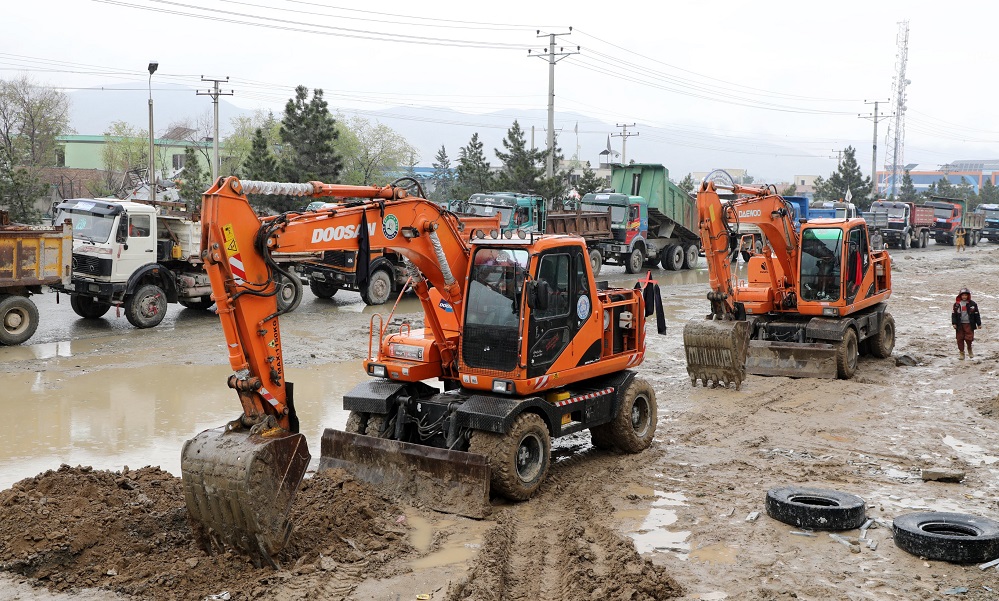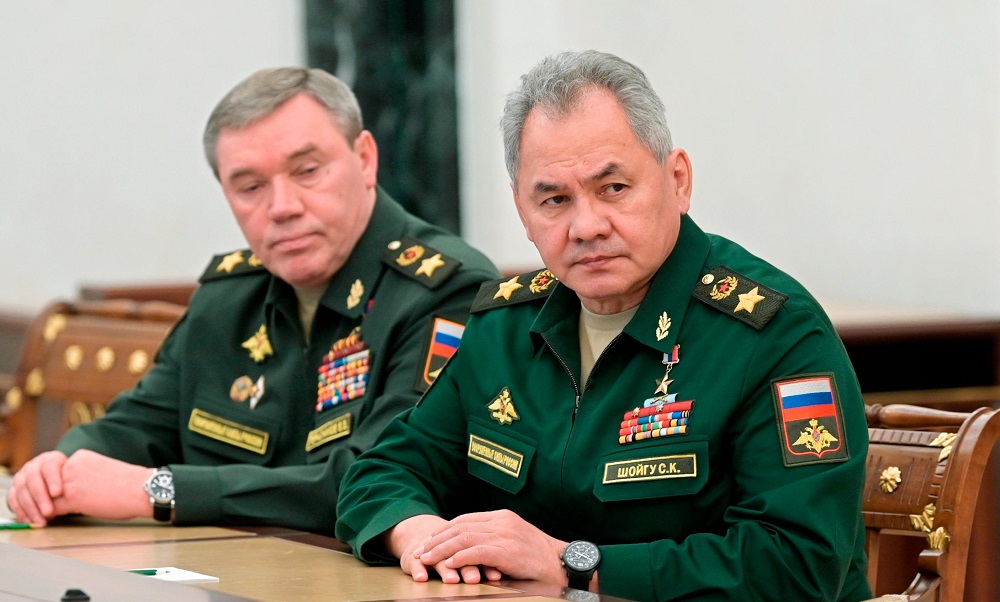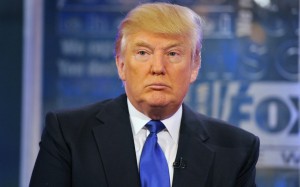Latest News
Trump struggles to explain ‘America first’ foreign policy

AP:_ Donald Trump strained to lay out a clear vision of his “America first” foreign policy on Wednesday, vowing to substitute hard-headed realism for what he called a post-Cold War era replete with U.S. national security failures.
Yet the Republican presidential front-runner outlined no strategy for how he’d make the United States at the same time a “consistent” and “unpredictable” force in the world. And he didn’t appear to allay the concerns of U.S. and international critics — Republicans at home as well as Democrats — who see him as unfit for the responsibilities of commander in chief.
“‘America first’ will be the major and overriding theme of my administration,” Trump declared, echoing motifs from his campaign that is now close to sealing the GOP nomination.
Delivering his lines in a more sober, restrained manner than usual to cast himself as presidential material, the billionaire businessman and reality TV star toned down or omitted several of his most explosive — and oft-repeated — barbs. He made no reference to forcing Mexico to pay for a wall across the nation’s Southern border. He also didn’t revisit the idea of allowing Japan, South Korea, Saudi Arabia or any other country to develop nuclear weapons for self-defense purposes.
Instead, Trump took aim at President Barack Obama’s embrace of an Iran nuclear agreement, Obama’s failure to eliminate the Islamic State group and other examples of what he termed a foreign policy of “randomness” and “chaos.” His criticism extended to Republicans, too, assailing President George W. Bush for the Iraq war and mocking a foreign policy establishment of “old people” who have scoffed at his diplomatic and national security credentials.
“It’s time to shake the rust off America’s foreign policy,” Trump told academics, reporters and a smattering of supporters in a Washington hotel ballroom after being introduced by one such old voice of the foreign policy elite — Zalmay Khalilzad, a Bush-appointed former ambassador to Afghanistan, Iraq and the United Nations.
“My foreign policy will always put the interests of the American people and American security above all else,” he said. “It has to be first. Has to be. That will be the foundation of every single decision that I will make.”
Trump’s “new direction” in American foreign policy was vague even by the standards of presidential campaigns.
The U.S. approach to fighting IS will be “strong” under a Trump administration, he vowed, offering no indication of troop levels he might authorize. He intends to ease tensions with Russia while negotiating “from a position of strength,” but he wouldn’t say what that means for U.S. sanctions punishing Moscow for annexing Ukrainian territory. He said he’d balance America’s massive commercial deficit with China “quickly,” without a word about tariff policy or existing trade agreements.
Trump also contradicted his own broad-brush approach to foreign policy. He said at one point that the best way to achieve his goals was through “disciplined, deliberate and consistent” policy. Later, however, he exhorted the nation to “be more unpredictable” in how it combats enemies.
“We have to be unpredictable starting now,” Trump declared in the 38-minute speech hosted by the Center for the National Interest, an organization founded by President Richard Nixon.
Democratic and Republican opponents immediately pounced on the speech’s substance, or lack thereof.
“No one wants an unpredictable ally,” said James Stavridis, the retired Navy admiral who served as NATO’s top commander in Europe from 2009 to 2013. “It sounds like isolationism.”
The “America First” anthem “is precisely what the world worries about,” said Christopher Hill, a Bush-appointed former ambassador to Iraq.
But Republican former presidential candidate Newt Gingrich voiced support.
“This was a serious foreign policy speech by Trump,” he tweeted. “It is worth reading and thinking about. It will be ridiculed by Washington elites.”
And the chairman of the Senate Foreign Relations Committee, Bob Corker of Tennessee, called it “a very good foreign policy speech,” but said he hoped for a time when “candidates in both parties will begin focusing not only on the problems we face but on solutions.”
Fresh off a sweep of five Northeastern primaries and on a clearer path to nomination, Trump repeated assertions that U.S. allies must contribute more to international security agreements, such as NATO, to reap the benefits of American military protection. Yet he tried to assure allies the U.S. would recommit to them if he’s elected president.
Some of the messaging was no different than Obama’s, Bush’s or any other recent U.S. leader. “We should seek common ground based on mutual interests,” Trump said of Russia and China, two leading geopolitical rivals.
But his criticism of the last 15 years of U.S. policy in the Mideast was particularly pointed. Trump’s likely opponent in the general election, Democrat Hillary Clinton, was Obama’s secretary of state and a key architect of the effort.
“We’ve made the Middle East more unstable and chaotic than ever before,” said Trump, lumping in Obama’s abandonment of U.S. ally Hosni Mubarak in Egypt, a record of recriminations with Israeli Prime Minister Benjamin Netanyahu and a refusal to enforce his own “red line” for military action after Syrian President Bashar Assad unleashed chemical weapons.

Latest News
Three road construction projects launched in Kabul

Three road construction projects worth about one billion Afghanis started in capital Kabul on Saturday.
The projects were inaugurated by Deputy Prime Minister for Economic Affairs Mullah Abdul Ghani Baradar.
The projects are: the second phase of Kotal Khairkhane road, the first part of the Shahid square to Qasaba, and the Airport road to Gumruk.
In the inauguration ceremony, Mullah Baradar said that Kabul municipality is working hard to beautify and regulate the city, and people should cooperate with the government in protecting public benefit projects.
He directed the officials of Kabul municipality to complete the mentioned projects on time and with good quality.
The second phase of Kotel Khairkhaneh road is 2.5 kilometers long and 60 meters wide. Thie road will cost 364 million Afghanis and will be completed in 20 months.
The Shahid square-Qasaba road is 1.8 kilometers long and 45 meters wide, which will be built at a cost of 175 million Afghanis in one year.
The Airport-Gumruk road is 2.7 km long and 60 meters wide, which will be completed at a cost of 407 million Afghanis in 20 months.
The projects are funded by Kabul Municipality.
Latest News
Russian defense minister says main threat for SCO countries emanates from Afghanistan

Russian Defense Minister Sergey Shoygu said on Friday that the main threat for the Shanghai Cooperation Organization (SCO) members emanates from Afghanistan where international terrorist groups find shelter due to unstable and indefinite political situation.
Speaking at a meeting of the SCO defense ministers in Kazakhstan’s capital Astana, Shoygu said Washington has stepped up efforts to restore its positions in Central and South Asia that were lost after the withdrawal of coalition troops from Afghanistan, Anadolu Agency reported.
The military chief called “unacceptable” the deployment of the American military infrastructure in the region, arguing that intentions should be regarded as “a direct threat to stability in the SCO space.”
According to him, the US is trying to impose a new security system in the Asia-Pacific region for dominance.
This comes as the Islamic Emirate has repeatedly emphasized that it does not allow anyone to pose threats to any other country from Afghanistan soil.
Recently, Mohammad Yaqub Mujahid, Acting Minister of National Defense Mohammad Yaqub Mujahid said that no destructive groups including Daesh have physical presence in Afghanistan,
Latest News
IEA calls Mujahideen Victory Day ‘freedom day’

In a statement on the occasion of the 32nd anniversary of the victory of the Mujahideen against the then communist government, the Islamic Emirate said that it is a day of freedom of the Afghan nation.
The Islamic Emirate described the coup by People’s Democratic Party of Afghanistan on 27th April 1978 as a dark day in history, as a result of which the people of Afghanistan suffered severe human and financial losses.
The statement said that the Afghan nation suffered huge casualties in their 14-year struggle against the thoughts and actions of the communists, as 1.5 million people died and millions more faced various hardships.
“After 20 years of Jihad, our country was freed from another occupation and the Islamic system was established, so the Islamic Emirate will make its utmost efforts so that the fruits of decades of sacrifice and struggle of this nation are not wasted,” the statement said.
“It was the wish of the martyrs to fully implement the Islamic system in the country, and therefore, the Islamic Emirate is trying to facilitate development and prosperity under the shadow of the Islamic system in order to realize the goals of the Afghan people’s jihads,” it added.
-

 Latest News4 days ago
Latest News4 days agoRashid Khan named AWCC’s brand ambassador
-

 World5 days ago
World5 days agoMalaysian navy helicopters collide in mid-air, 10 killed
-

 Sport4 days ago
Sport4 days agoJaiswal ton powers Rajasthan to big IPL win
-

 World4 days ago
World4 days agoNorth Korea officials visit Iran in a rare public trip
-

 Latest News5 days ago
Latest News5 days agoAt least 1,500 families affected by recent floods: IRW
-

 Sport5 days ago
Sport5 days agoMawj Sahil player scores stunning halfway line goal in 1-0 win over Jawanan Wahedi
-

 Sport4 days ago
Sport4 days ago‘Serious talent’ Fraser-McGurk bonds with Warner to light up IPL
-

 Latest News5 days ago
Latest News5 days agoUS report cites ‘significant deterioration’ in Afghan women’s rights last year















